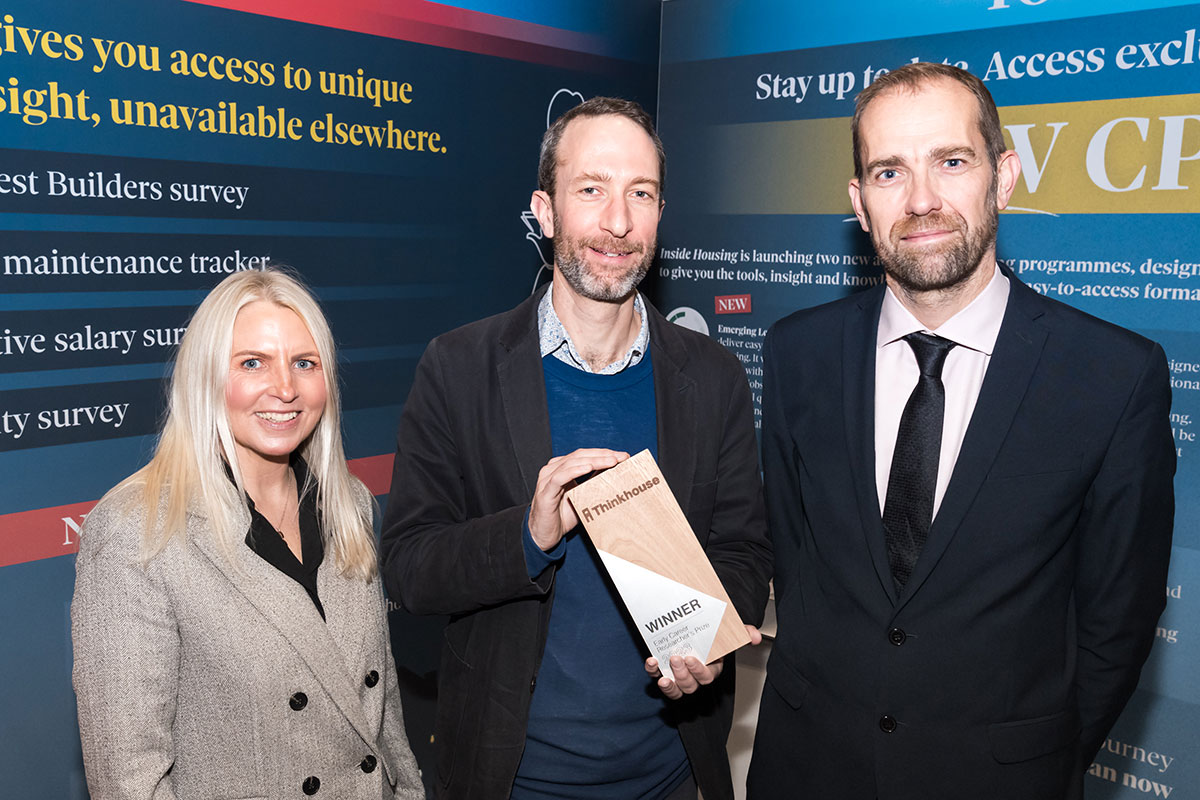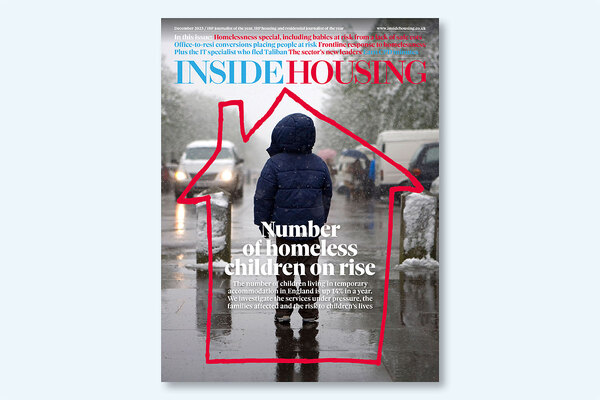You are viewing 1 of your 1 free articles
Radical planning paper wins junior housing researcher prize
A paper calling for a flexible zoning system in which builders can develop land without needing to seek planning permission has won the Thinkhouse Early Career Researcher’s Prize 2019.
Anthony Breach, an analyst at thinktank Centre for Cities, beat stiff competition from four other shortlisted papers to win the competition, which is supported by Inside Housing and aims to give researchers in the early stages of their careers an opportunity to showcase their work.
Mr Breach’s paper, Capital Cities: How the Planning System Creates Housing Shortages and Drives Wealth Inequality, uses mortgage lending data to show the connections between the housing shortage in our cities, the North-South divide and rising wealth inequality.
The paper argues for measures to “reconnect housing supply to local demand”, including a “by-right” planning system.
This would give builders who want to build homes the right to do so automatically, providing their proposals comply with building regulations and local plans and the local authority doesn’t explicitly object. The paper recommends the government studies “the success of flexible zoning systems” in Japan and parts of the US.
It also recommends measures to increase taxation of housing wealth, calls on ministers to explore alternative wealth-building vehicles to housing and proposes limiting the influence of nimbys in the planning system.
Anya Martin, last year’s prize winner and a judge this year, described Mr Breach’s piece as a “fantastically interesting piece of research” with a “clear and logical progression of argument”.
She said: “Most importantly it is also an impact-focused piece, with the findings neatly leading on to a set of coherent and topical policy recommendations.”
Mr Breach said his work had led to the realisation that return on investment in housing is linked to local economic performance but that housing supply doesn’t respond in turn. “This creates wealth inequalities but also inequalities between regions,” said Mr Breach.
Mr Breach won £500, an Inside Housing subscription and the chance to have his work showcased by Inside Housing.
The runner-up prize went to Shahina Fatima Begum, customer insight officer at Peabody, for her paper People, Processes and Payments: Learning from the Experiences of Universal Credit Claimants that are in Rent Arrears
The prize is sponsored by Altair and L&Q and organised by Thinkhouse, a website that collates and critiques housing research and provides monthly research reviews for Inside Housing.
An extract from the Thinkhouse Early Career Researcher's Prize 2019 winning paper
An extract from Capital Cities: How the Planning System Creates Housing Shortages and Drives Wealth Inequality, by Anthony Breach:
The planning system creates housing shortages
The housing shortages shown above are ultimately caused by how the English and Welsh planning systems ration land for development in and around cities.
Measures such as the green belt, conservation areas, sightlines and height limits in cities, and the control of development through the planning permission system, all decouple the supply of housing from local demand and its price signals.
The result is predictable in that the point of these policies is to reduce development, but the effect is to make the future supply of housing unpredictable and unresponsive to demand for new housing.
Requiring every development to receive an explicit ‘yes’ from the local authority through planning permission means supply is capped at the rate at which the local authority grants permissions.
The objective of the planning system should be to provide public goods and reduce negative externalities, not to reduce development. Enhancing urban mobility as cities grow, connecting new homes and employment spaces with existing infrastructure, and identifying changing demand for public services are all some of the crucial responsibilities planning has within local economies.
These can all be achieved under a planning system in which the supply of housing is more responsive to local demand.
When controls on development have been reduced, supply has been driven by demand.
The introduction of Permitted Development Rights (PDR) to allow offices to be converted to housing without planning permission from the local authority in 2013 saw housing supply increase in expensive cities. From 2015-17, 48% of all new housing in Crawley was delivered through PDR office conversions, as was 35% in Basildon and 34% in Slough.
In contrast, in much more affordable cities like Wigan, Liverpool, Blackburn, and Hull, zero homes were supplied through PDR.
Aspects of PDR, including its use of office stock and the size of the new homes permitted, have been controversial.
“The combination of severe rationing of new supply with private homeownership and free flowing capital is costly”
But these issues with PDR are about the loosening of building regulations that are linked to this specific policy, and existing building regulations could be retained as the planning system’s rationing of land use is reformed.
Relaxing the requirements for planning permissions allowed new supply in PDR to be driven by local demand, which ensured new homes were concentrated in the cities where they were needed most.
However, because PDR conversions are currently limited to a narrow set of circumstances, supply remains decoupled from demand for every other kind of development.
The combination of severe rationing of new supply with private homeownership and free flowing capital is costly.
State controls on private development means we have all of the volatility of capitalism without its productive potential. Planning policy enables large increases in housing wealth for homeowners in cities with successful economies due to controls on new supply.
Anthony Breach, analyst, Centre for Cities
How the Early Career Researcher’s Prize 2019 winning entry was selected
The prize was promoted extensively on social media and other channels
What is it?
The Thinkhouse Early Career Researcher’s prize, which is in its second year and is supported by Inside Housing, aims to give researchers in the early stages of their career “an opportunity to showcase their work to a wide and influential audience”.
It is open to those with up to eight years’ research experience, with or without a PhD, and those working in non-academic as well as academic institutions.
Entries were encouraged from the voluntary sector, thinktanks, housing associations, local authorities and journalists.
The criteria
The judging panel scored each paper on the following areas:
- Writing style/clarity
- Engagement with literature and theory
- Methods
- Empirical rigour/theoretical depth
- Strength of conclusions
- The extent of how the research is outcome and impact-focused so that it contributes to useful knowledge exchange
- The scalability of the research (ie the scope to make a widespread difference)
Who was on the judging panel?
- Stephen Aldridge, director for analysis and data, Ministry of Housing, Communities and Local Government
- Carl Brown, head of engagement, Inside Housing
- Professor Phil Brown, professor of social policy, University of Salford
- Professor Ken Gibb, director, CaCHE
- Richard Hyde, founder and editorial panel chair, Thinkhouse
- Anya Martin, winner of the Early Career Researcher’s Prize 2018
- Steve Moseley, group director of governance, strategy and communications, L&Q
- Jennifer Rolison, marketing executive, Altair
What the judges said:
“Anthony grappled with the complex issue of wealth inequality and how it is tied to housing and place, and expressed his analysis in an accessible and thoughtful style. It was clear he had thought carefully not just about the ideas he wanted to convey but also how these could be implemented. These two elements together really made Anthony stand out from the other submissions.
“Shahina made a fantastic contribution by drawing on primary research with people on Universal Credit who provided their lived experience of the welfare system and its connection to housing costs. The accounts presented by Shahina were artfully presented and adds to our knowledge about what it is like living at the sharp end of the welfare system. This was a very well written piece.”
Professor Phil Brown
“Anthony’s submission was a fantastically interesting piece of research, with a clear and logical progression of argument through the stages of analysis. Most importantly, it is also an impact-focused piece, with the findings neatly leading on to a set of coherent and topical policy recommendations.
“Shahina’s submission is a fascinating and detailed look at how Universal Credit has impacted real people’s lives. It is well-researched and reflective, has a strong practical focus, and comes with a set of clear policy recommendations.”
Anya Martin
“Anthony’s piece was very well-written and addressed the criteria of the competition better than any other submission. It started well and got better with clearly presented graphics that explained the data. The policy tools are all realistically available.
“Shahina’s piece had a clear writing style, a great literature review section and a very practical focus, making this report easy to read and understand. It offered immediate value to any housing practitioner dealing with the implications of Universal Credit.
“This was the second year we have run the prize and we saw an increase in entries, which led to bigger shortlist of papers for our judges to review. All of these were of a good enough quality to win the competition.”
Richard Hyde
“I liked Anthony’s paper for its clarity, logical argument and first-rate use of evidence and data. The implications for housing and planning policy will be controversial for many but are no less important for that.
“Shahina’s paper is a very well thought through piece of work. It makes good use of qualitative research to draw out insights about the impact of a key welfare reform.”
Stephen Aldridge
What is Thinkhouse?
Thinkhouse was formally launched in spring 2018, and aims to “provide a single location and summary of the best and most innovative research pieces, policy publications and case studies”.
It specifically looks at reports that propose ways to boost the amount and quality of housing and the economic, social and community issues of not doing this.
The Thinkhouse editorial panel highlights the ‘must-read’ reports, blogs about them and runs the annual Early Career Researcher’s Prize.
The panel includes current and former housing association chief executives, academics, lawyers, economists and consultants. It is chaired by Richard Hyde, chief executive of a business that sells construction hand tools.
Who is on the panel?
Richard Hyde | Chair of Editorial Panel, CEO of HYDE |
Gemma Duggan | Head of Compliance and Performance at Extracare |
Chris Walker | Economist |
Brendan Sarsfield | CEO, Peabody |
Mick Laverty | CEO, Extracare Charitable Trust |
Martin Wheatley | Senior Fellow, Institute for Government, |
Kerri Farnsworth | Founder & MD, Kerri Farnsworth Associates |
Suzanne Benson | Head of Real Estate for the Manchester office of Trowers. |
Burcu Borysik | Policy Manager at Revolving Doors Agency, |
Ken Gibb | Professor in housing economics at the University of Glasgow, Director of CaCHE |
Peter Williams | Departmental Fellow, Department of Land Economy, University of Cambridge |
Brian Robson | Executive Director of Policy and Public Affairs at the Northern Housing Consortium |
Francesca Albanese | Head of Research and Evaluation at Crisis |
Jules Birch | Journalist and blogger |
Susan Emmett | Head of Engagement for Homes England |
Mark Farmer | Founder and CEO Cast Consultancy |
Steve Moseley | Group Director of Governance, Strategy & Communications at L&Q |
Jennifer Rolison | Head of marketing at Aquila Services Group |
Philip Brown | Professor of Housing and Communities at the University of Huddersfield |
Anya Martin | Senior researcher at the National Housing Federation |
Emily Pumford | Policy & strategy advisor, Riverside |
Anthony Breach | Analyst, Centre for Cities |
Shahina Begum | Customer Insight Office, Peabody |












